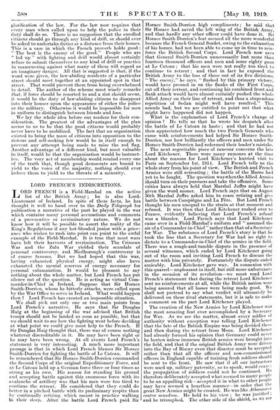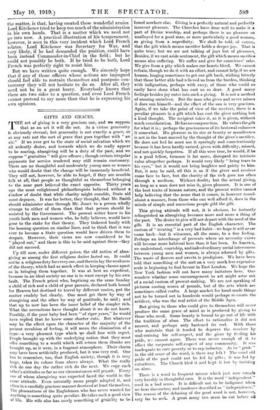LORD FRENCH'S INDISCRETIONS.
LORD FRENCH is a Field-Marshal on the active list of the British Army ; he is also Lord- Lieutenant of Ireland. In spite of these facts, he has thought it well to hand over to the Daily Telegraph for publication a narrative of the part he played in the war which contains many personal accusations and comments of a provocative or recriminatory nature. We do not know how it will be possible to assert the reality of the King's Regulations if any hot-blooded junior with a griev- ance who wishes to rush into print can point to the awful example of the Field-Marshal. It is true that most wars have left their harvests of recrimination. The Crimean War and the Zulu War yielded their scandals of personal controversy, and Marlborough's controversy is of course famous. But we had hoped that this war, having exhausted physical energy, might also have exhausted the mental reserves of energy necessary for personal calumniation. It would be pleasant to say nothing about the whole matter, but Lord French has put silence out of the question. He is acting as virtual Com- mander-in-Chief in Ireland. Suppose that Sir Horace Smith-Dorrien, whom he bitterly attacks, were called upon by the War Office to serve in Ireland. What would happen then ? Lord French has created an impossible situation.
We shall pick out only one or two main points from Lord French's narrative. He says that Sir Douglas Haig at the beginning of the war advised that British troops should not be landed as soon as possible, but that we should wait to see how the fighting went before deciding at what point we could give most help to the French. If Sir Douglas Haig thought that, there was of course nothing whatever discreditable in it. He may have been right or he may have been wrong. At all events Lord French's statement is very interesting. A much more important passage is that in which Lord French blames Sir Horace Smith-Dorrien for fighting the battle of Le Cateau. It will be remembered that Sir Horace Smith-Dorrien commanded the Second Corps of the original Expeditionary Force, and at Le Cateau held up a German force three or four times as strong as his own. His reason for standing his ground and accepting battle against this enormous force with its avalanche of artillery was that his men were too tired to continue the retreat. He considered that they could do better in a pitched battle with its preliminary respite than by continually retiring, which meant in practice walking in their sleep. After the battle Lord French paid. Sir
Horace Smith-Dorrien high compliments ; he said that Sir Horace had saved the left wing of the British Army, and that hardly any other officer could have done it. Sir Horace Smith-Dorrien's feat seemed all the more wonderful because the French General Sordet, owing to the exhaustion of his horses, had not been able to come up in time to rein- force the British Second Corps. Lord French now save that General Smith-Dorrien unnecessarily lost more than fourteen thousand officers and men and some eighty guns at Le Cateau ; that his men were not really too tired to continue to retreat ; and that in fact he exposed the British Army to the loss of three out of its five divisions. " The enemy," he says, " flushed by this primary victory, would have pressed in on the flanks of the First Corps, cut off their retreat, and continuing his combined front and flank attack would have almost certainly pushed the whole Allied Army on their line of retreat, and thus a stupendous repetition of Sedan might well have resulted." This sounds bad, but we are entitled to point out that what might have happened did not happen.
What is the explanation of Lord French's change of opinion ? He tells us that he wrote his despatch after the battle of Le Cateau in haste ; and that he had not then appreciated how much the two French Generals who came with reinforcements had helped Sir Horace Smith- Dorrien, nor how brilliantly the officers and men under Sir Horace Smith-Dorrien had redeemed their leader's mistake.
The next regrettable piece of rancour concerns the late Lord Kitchener. There were many rumours at the time about the reasons for Lord Kitchener's hurried visit to Paris on September 1st, 1914. Lord French tells us the whole story from his point of view. The British and French Armies were still retreating ; the battle of the Marne had yet to be fought. The question was when the Allied Armies should turn on their pursuers and take the offensive. Some critics have always held that Marshal Joffre might have given the word sooner. Lord French gays that on August 30th Marshal Joffre asked him to cease retiring and giN e battle between Compiegne and La Fere. But Lord French thought his men unequal to the strain at that moment and refused. It was then that Lord Kitchener rushed over to France, evidently believing that Lord French's refusal was a blunder. Lord French says that Lord Kitchener came over in a Field-Marshal's uniform and " assumed the air of a Commander-in-Chief " rather than that of a Secretary for War. The substance of Lord French's story is that he took the line that a Secretary for War had no right to dictate to a Commander-in-Chief of the armies in the field. There was a rough-and-tumble dispute in the presence of several witnesses, which ended by Lord Kitchener going out of the room and inviting Lord French to discuss the matter with him privately. Fortunately the dispute ended amicably. Lord Kitchener gave way. In connexion with this quarrel—unpleasant in itself, but still more unfortunate in the occasion of its revelation—we must read Lord French's statement that during the retreat Lord Kitchener sent no reinforcements at all, while the British nation were being assured that all losses were being made good. We shall not pretend to say what verdict will ultimately be delivered on these rival statements, but it is safe to make a comment on the part Lord Kitchener played.
The creation of the New Armies by Lord Kitchener was the most amazing feat ever accomplished by a Secretary for War. As we see the matter, almost every soldier of authority without exception was telling Lord Kitchener that the fate of the British Empire was being decided there and then during the retreat from Mons. Lord Kitchener had already formed his opinion that Germany could never be beaten unless immense British armies were brought into the field, and that if the original British Army were driven into the Bay of Biscay even that disaster must be accepted rather than that all the officers and non-commissioned officers in England capable of training fresh soldiers should be sent to the front. He saw that if all our instructors were used up, military paternity, so to speak, would cease : the propagation of soldiers could not be continued. He therefore deliberately accepted what seemed to many people to be an appalling risk—accepted it in what to other people may have seemed a heartless manner—in order that the great New Armies might be created. He was like Aflia719811e3 contra inuncluin. He held to his view ; he was justified and he triumphed. The other side of the shield, as we see
the matter, is that, having created these wonderful armies Lord Kitchener tried to keep too much of the administration in his own hands. That is a matter which we need not go into now. A practical illustration of his temperament, however, is seen in this very incident which Lord French relates. Lord Kitchener was Secretary for War, and very likely, if he had demanded the position, could have been instead Commander-in-Chief in the field ; but he could not possibly be both. If he tried to be both, Lord French was perfectly right to resist him.
But we have written quite enough. We sincerely hope that if any of those officers whose actions are impugned should feel able to restrain themselves and postpone con- troversy they will not hesitate to do so. After all, they need not be in a great hurry. Everybody knows that there are two sides to a question, and even Lord French cannot pretend to say more than that he is expressing his own opinions.







































 Previous page
Previous page